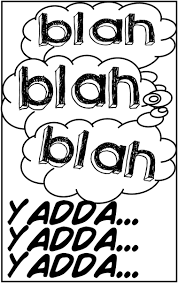 You probably don’t believe that silence is one of my favorite tools. Certainly, when I taught a presentation skills class to Johns Hopkins graduate students, they did not expect me to talk about silence! But I did. And at the end of the week, their final presentations showed how silence can be so effective.
You probably don’t believe that silence is one of my favorite tools. Certainly, when I taught a presentation skills class to Johns Hopkins graduate students, they did not expect me to talk about silence! But I did. And at the end of the week, their final presentations showed how silence can be so effective.
When Mariah began her program, we all saw the power of silence take over. She paused. Then she made eye contact with her audience. She waited. Only when a room full of curious eyes were focused on her did she begin to speak?
We saw it when Kristin began her meeting with a question — neither simplistic nor overly complex — designed to transform an audience into a group of participants. She asked. She waited. Sometimes she waited five to eight seconds, and five to eight seconds of silence is longer than you might think! It’s very hard to listen to silence.
We watched Tad use silence in a marketing brainstorming session. There was a blizzard of ideas, but when the flurries slowed and then stopped, he didn’t move on. He waited, in silence, for a full 60 seconds. The best ideas of the session followed that silence.
And I know that skillful negotiators, like my colleague Michael, use silence in their work every day. I’ve heard Michael say,
“The person who speaks first, loses.”
I think he’s right, and how-to books on negotiation concur.
I like to use silence in the appreciation segment of a team-building session (my favorite part of these workshops!) when colleagues tell one another what they genuinely like about working together. The inevitable lull comes, and everyone looks at me as if to say, “Well, we did it. Can we go home now?” I just smile and wait, knowing that my silence will give them time to appreciate one another in a deeper way.
How can you use the power of silence in your work and life?
______
Karen Snyder is an MGRUSH professional facilitation alumni. Having come into our class with quite a bit of coaching experience, she was not only an excellent student but a valuable contributor. Her article on the power of silence reminds us of Dr. Amy Cuddy’s research on ‘Presence’. Cuddy demonstrates that people answer two questions when they first meet someone:
- Can they TRUST the person?
- Can they RESPECT the person?
Others may refer to these two dimensions as ‘warmth’ and ‘competence’. Cuddy effectively asserts they clearly develop in the sequence shown. Trust always comes before respect.
Silence generates trust when the persona exudes warmth, compassion, alertness, and sincerity. Professionally, however, most believe that competence comes first. However, it does not develop until trust is established.
Dr. Max Bazerman claims the most powerful word in negotiations is “huh” — as in, tell me more. Listening, not speaking, makes you a more powerful negotiator. Likewise, silence can make you appear to be a warmer and more trustworthy person and facilitator.
Terrence Metz, MGRUSH Facilitation Training
______
Don’t ruin your career by hosting bad meetings. Sign up for a workshop or send this to someone who should. MGRUSH workshops focus on meeting design and practice. Each person practices tools, methods, and activities daily during the week. Therefore, while some call this immersion, we call it the road to building high-value facilitation skills.
Our workshops also provide a superb way to earn up to 40 SEUs from the Scrum Alliance, 40 CDUs from IIBA, 40 Continuous Learning Points (CLPs) based on Federal Acquisition Certification Continuous Professional Learning Requirements using Training and Education activities, 40 Professional Development Units (PDUs) from SAVE International, as well as 4.0 CEUs for other professions. (See workshop and Reference Manual descriptions for details.)
Want a free 10-minute break timer? Sign up for our once-monthly newsletter HERE and receive a free timer along with four other of our favorite facilitation tools.
______
With Bookmarks no longer a feature in WordPress, we need to append the following for your benefit and reference
- 20 Prioritization Techniques = https://foldingburritos.com/product-prioritization-techniques/
- Creativity Techniques = https://www.mycoted.com/Category:Creativity_Techniques
- Facilitation Training Calendar = https://mgrush.com/public-facilitation-training-calendar/
- Liberating Structures = http://www.liberatingstructures.com/ls-menu
- Management Methods = https://www.valuebasedmanagement.net
- Newseum = https://www.freedomforum.org/todaysfrontpages/
- People Search = https://pudding.cool/2019/05/people-map/
- Project Gutenberg = http://www.gutenberg.org/wiki/Main_Page
- Scrum Events Agendas = https://mgrush.com/blog/scrum-facilitation/
- Speed test = https://www.speedtest.net/result/8715401342
- Teleconference call = https://youtu.be/DYu_bGbZiiQ
- The Size of Space = https://neal.fun/size-of-space/
- Thiagi/ 400 ready-to-use training games = http://thiagi.net/archive/www/games.html
- Visualization methods = http://www.visual-literacy.org/periodic_table/periodic_table.html#
- Walking Gorilla = https://youtu.be/vJG698U2Mvo
With over 25 years in the speaking and training profession, Karen is a highly skilled and interactive facilitator. Her warm, enthusiastic style immediately puts her audience at ease. Participants appreciate her authenticity and empathy while they enjoy laughing with her at the humor and contradictions inherent in all organizations. Employees leave her sessions with information, insight, and skills that make them better communicators and co-workers.
Karen holds a master’s degree in organizational development from Johns Hopkins University and an undergraduate degree in industrial psychology from the University of Virginia. She has been accepted as a full member of the National Speakers Association and is a CSP (Certified Speaking Professional). Karen is president of NSA-DC Chapter (2016-2017) and she is on the steering committee of the Human Resources BioAlliance (HRBA).



